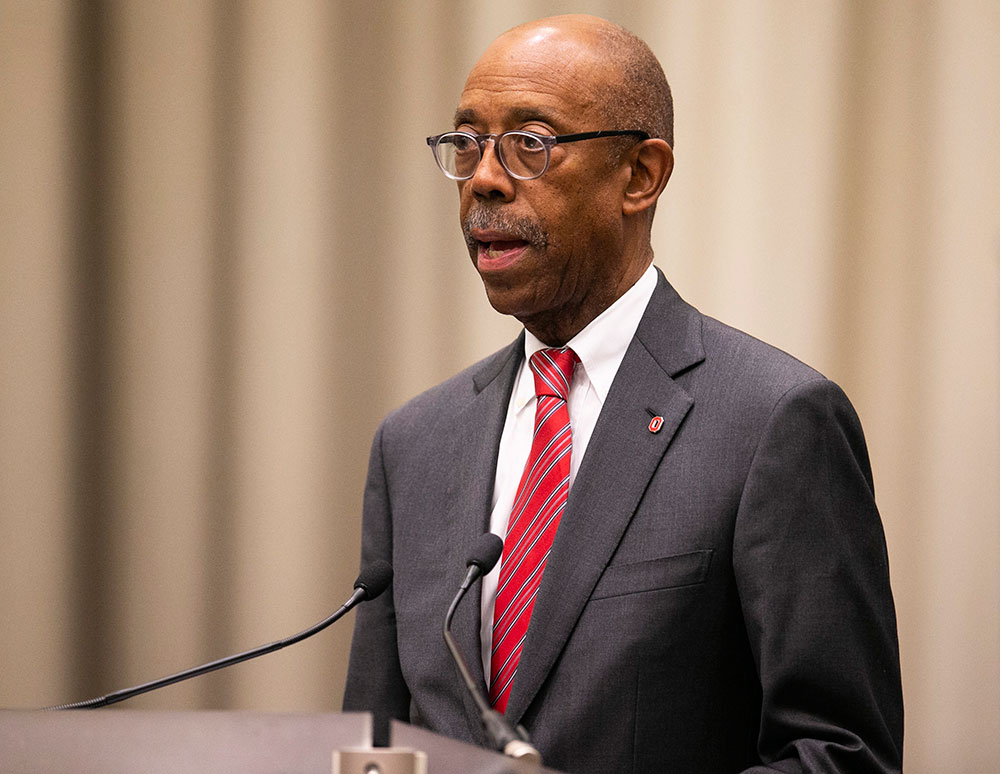NCAA promises expanded sexual-violence policies
Victims and advocates are skeptical, saying the organization has failed to take action before.

The NCAA will expand its sexual violence policy, the college athletics organization confirmed Wednesday during its annual conference, but sexual assault survivors and advocates remain skeptical it will be tough enough.
The NCAA Board of Governors reviewed its stance on athletes accused or convicted of sexual assault this week amid congressional pressure stemming from a USA TODAY Network investigation called “Predator Pipeline.” Published in December, the investigation found dozens of athletes who’ve transferred to NCAA schools in recent years despite being disciplined for sexual assault at previous colleges.
Board chairman Michael Drake, the president of Ohio State University, said after the meeting that the board will schedule a special session in the next few weeks to finalize the policy. He did not offer details on what it will encompass.
“This has been an active area of discussion for us over these, honestly, last several months and years,” Drake said after the meeting. “It’s time, we think, to revisit the policy, which we’re going to do.”
It is unclear if the policy will prescribe a uniform set of regulations for all schools, require each school to institute its own rules, or something else entirely. Drake dodged a question from a reporter on Wednesday asking if the new policy will ban athletes found responsible for sexual offenses by their schools or in court.
“We’ll have to wait until the policy is determined,” Drake said, “but we’ll look at that in the next couple weeks, and we’re looking forward to it.”
Some doubt the organization’s commitment to fixing the issue. Empty promises have long been the hallmark of NCAA leaders, said Kathy Redmond, head of the National Coalition Against Violent Athletes.
“They have failed to act over a span of decades of complaints by sexual-assault and interpersonal-violence victims, many of whom are female NCAA athletes,” Redmond. “They have chosen profits over people, words over actions, perpetrators over victims.”
Nancy Hogshead-Makar, a former Olympic swimmer, rape survivor and founder of the advocacy organization Champion Women, said any new policy must have enforcement mechanisms and outline consequences for schools that break it.
“Without consequences, it will not protect women,” Hogshead-Makar said.
Brenda Tracy, who in 1998 reported being raped by NCAA athletes, co-authored her own serious misconduct policy, the Tracy Rule, which reflects a strict zero-tolerance approach to sexual violence. She remains hopeful the new NCAA rule will, too.
“I’m cautiously optimistic,” she said. “It’s fairly easy to adopt a policy that looks good in theory and creates some positive media buzz, but doesn’t actually address the real issues going on in college athletics.”
Congressional study
Unlike the pro leagues, the NCAA currently has no personal conduct policy and no specific penalties for those who commit sexual assault, the USA TODAY Network’s four-part series found. Even when expelled, suspended or criminally convicted for sexual offenses, athletes can transfer to other NCAA schools and return to the field in a year or less.
The investigation’s findings drew the ire of women’s groups, sexual assault organizations and members of Congress, including U.S. Rep. Donna Shalala, D-Florida, who filed a bill last month that will specifically address issues raised in the investigation, she said.
Co-sponsored by Rep. Ross Spano, the Congressional Advisory Commission on Intercollegiate Athletics (CACIA) Act would create an independent commission to study the NCAA.
The Board of Governors – comprised of 19 university presidents, chancellors and athletic directors – has been aware of the issue for years. But it has resisted previous calls by eight U.S. senators and its own study commission to fix it.
Drake himself was part of an NCAA study group, the Commission to Combat Campus Sexual Violence, that in 2018 advocated for the organization to tie athlete eligibility to behavior. But the board, of which he was not a member at the time, disbanded the group instead.
A handful of NCAA conferences and individual schools have adopted their own policies disqualifying athletes disciplined for sexual and violent offenses.
The strictest is the Tracy Rule, which the University of Texas at San Antonio became the first school to adopt in September. It is modeled after the Big Sky Conference’s Serious Misconduct Rule, but it goes further by requiring schools to request disciplinary records from incoming transfer-athletes’ previous institutions.
Reclaim MSU, a survivor advocacy group at Michigan State University, told the USA TODAY Network in a statement that the NCAA policy should be at least as strong as the Big Sky’s.
“As we saw at Michigan State University with the recruitment of Auston Robertson, athletic departments have too many incentives to put competitive advantage ahead of student safety,” Reclaim MSU said.
MSU football coaches recruited Robertson despite numerous allegations of sexual misconduct while he was in high school. He went onto plead guilty to sexually assaulting an MSU teammate’s girlfriend and is now in jail.
“For this culture of rape acceptance to end,” the organization said, “the NCAA must act.”
USA TODAY’s Dan Wolken contributed reporting.